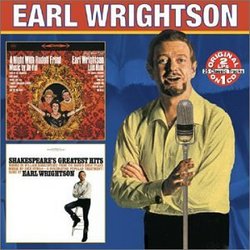Bravo !!!
Guillaume | GA United States | 07/13/2003
(5 out of 5 stars)
"Hooray! One of my favorite LP's, "NIght with Rudolf Friml," is finally on CD! The sound quality is excellent for a recording which is more than 40 years old. The marvelously rousing "Song of the Vagabonds" is perhaps my favorite vocal track ever, thanks to the splendidly robust voice of Earl Wrightson. This song alone makes this CD a worthwhile purchase. It's great to finally hear it again after so many years! Thank you, Collectables!"
Two Classic Albums Whose Re-Issue Is Long Overdue
Enda Bracken | BRIGHTON, QLD Australia | 06/15/2006
(5 out of 5 stars)
"The "A Night with Rudolf Friml" album from 1961 is the equal of the preceding "Nights" using the songbooks of Jerome Kern and Sigmund Romberg. Whereas the former two were conducted by Percy Faith - rather superbly - this one is conducted by Frank deVol who is not as emotionally sweeping in style in his arrangements as Mr Faith but brings his own legitimate flavour in his arrangements as well as a tight conducting style. In terms of production values , it is still skimpy - there is no men's chorus in the "Song of The Vagabonds" and in the "Donkey Serenade" there is no response singing dialogue (in other solo efforts the male usually sings both parts - here Wrightson leaves out one "character" altogether.
Nevertheless the performances are benchmarks for other performers in terms of vitality and panache when dealing with what even then was becoming an archaic music form (which I still love). Earl Wrightson is outstanding whether he sings the melody or, in the duets with his wife Lois Hunt, the harmony line. The recording technique particularly favours his voice - he sounds magnificent.
However, as on the two earlier "Nights", Lois Hunt's fine American soprano - quite superb diction without the "plummy-ness" of other formal singers - is given quite a harsh tone. The orchestral spread is far more detailed and shaded than the earlier outings and the strings in particular sound considerably less harsh.
The second album "Shakespeare's Greatest Hits" (from 1964 in "360 Stereo") in this "two-for" is a gem. It was in celebration of the 400th anniversary of the birth of William Shakespeare in 1964. Firstly, the music composed by Dick Hyman is wonderful as an example of matching melody and rhythms to existing verse. It is melodically rich whilst remaining true to the difficult language - in fact it makes Shakespeare's English very accessible to the modern ear.
Secondly, however the real delight is Dick Hyman's arrangements. He cheerfully abandons an artificial "English Elizabethan madrigal" sound for a cheerfully piratical pastiche of modern forms. This philosophy obviously states that "if you can't replicate the musical sensibility of the original times, then don't try.
Keeping in mind that this is 1964 - about 1 year before Herb Alpert & The Tijuana Brass came into vogue, Hyman uses trumpets - allegedly "Elizabethan" - that sound astonishingly like a Mariachi group in "Lawn As White As The Driven Snow". In "Daffodils Begin To Peer" the instrumentation is decidedly "Celtic" / "sailors' hornpipe" with a mandolin / banjo. In "Sigh No More" he uses a military march arrangement. In "Winter and Spring (et al)" he uses a spanish guitar. In "It Was A Lover And His Lass" sounds almost like the "Georgy Girl" arrangement from 2 years later - with a great irreverent men's chorus and banjo. In "O Mistress Mine" is a serenade with a Nashville's strings country sound particularly with the strings playing against the tempo very much as in the "Largo" in the Winter movement of Vivaldi's 4 "Four Seasons". "Will You Buy Any Tape" is also in a march tempo and pushes the tempos beautifully with the men's chorus matching Wrighton step by step. "When That I was A Little Tiny Boy" is almost a parody of a western theme sung by Frankie Laine - it develops in an anthem-like progression. In "Come Away, Come Away Death" there is a Spanish/Latin flavour with guitar and bongo and evocative sultry strings. "Blow Blow Thou Winter Wind" also has a western cowboy sensibility with guitar and percussion. In "who Is Sylvia" there is a flamenco tempo and rhythm with castanets sneaking in.
Now all of this should not work. But it does. For one thing Shakespeare was born in 1540 some 50 years after the Moors (islam) had been evicted from Spain in 1492 after several centuries. England at time was sufficiently cosmopolitan to have felt many of the Spanish/ Moorish / Latin musical influences of neighbouring countries. The rhythms that are familiar to us in the 20th century had their antecedents a thousand years before. Dick Hyman so cheerfully employs a "modern" ambience with such confidence and his tempos and phrases chops up the Shakespearean text so cogently and respectfully that the modern listener absorbs the meaning of the 4 centuries-old language easily.
But no matter how skilled and facile Hyman was in his composing and orchestration and conducting, it would all be lost if it was not for Wrightson's virile vocal interpretation. It is all romantic. It is all poetic. It is all "manly".
Quite wisely the album opens with a spine-chilling rendition of "Take O Take Those Lips Away". It is powerful, melodic and passionate - and Wrightson's voice is magnificent.
And this is the overwhelming factor. Wrightson takes the complex language and rhythms of the verses and ties them so convincingly to Hyman's melodies that it all seems natural. Even the "hey nonny nonnies" seem as fitting as the ubiquitous "oh yeahs" and "naa-naa-naas" of today's musical literature.
A tour de force.
It should be a required resource in any "Introducing Shakespeare" course.
"

